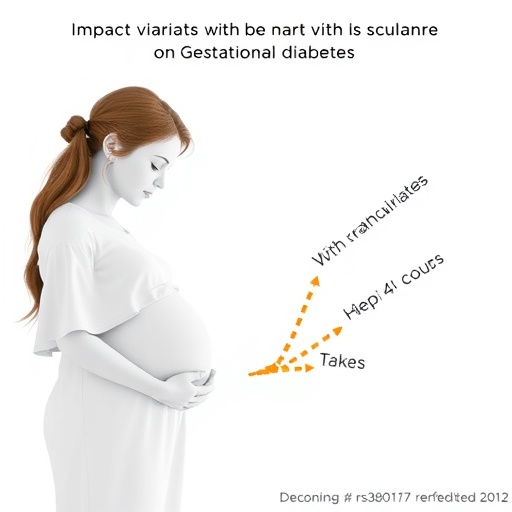In a groundbreaking study published in Scientific Reports, researchers have delved into the intricate genetic mechanisms underlying gestational diabetes mellitus (GDM), particularly focusing on the effects of a specific polymorphism known as rs3802177 G/A. This research is particularly relevant for the Malay population, a demographic that has shown a notable predisposition to GDM. The findings of this study could provide critical insights into the complex interplay between genetics, RNA expression, and the risk of developing gestational diabetes.
The study’s primary aim was to explore how the rs3802177 G/A polymorphism influences the expression of the SLC30A8 gene, which is known to play a vital role in insulin secretion and glucose homeostasis. The SLC30A8 gene encodes a zinc transporter that is crucial for pancreatic beta-cell function. Dysregulation of this gene may contribute to the development of diabetes, making it a valuable target for understanding GDM risk factors in pregnant women.
Utilizing advanced molecular techniques, the research team assessed the transcript levels of SLC30A8 mRNA in relation to the presence of the rs3802177 polymorphism. This polymorphism can alter how the gene is expressed at the mRNA level, potentially leading to variations in zinc transport and thus impacting insulin production in the body. By examining this genetic variation specifically in Malay women, the study highlights the importance of ethnicity in diabetes susceptibility and the significance of tailored research in public health.
Additionally, the study investigated the relationship between SLC30A8 expression and hsa-miR-183-5p, a microRNA believed to regulate various metabolic processes. MicroRNAs are small, non-coding RNA molecules that play essential roles in gene expression modulation. The interaction between SLC30A8 mRNA and hsa-miR-183-5p may provide insights into how genetic factors influence metabolic pathways during pregnancy, thereby elucidating the biological basis for increased GDM risk in specific populations.
The findings indicate that the G/A polymorphism at rs3802177 is associated with altered expression levels of SLC30A8 mRNA, suggesting that this genetic variant may significantly impact beta-cell function and insulin signaling during pregnancy. This insight underscores the need for genetic screening and personalized medical approaches in managing GDM, particularly for populations that exhibit high prevalence rates of diabetes.
Furthermore, the researchers highlighted the significance of understanding the underlying genetic architecture of GDM. Recognizing how specific single nucleotide polymorphisms (SNPs) like rs3802177 influence gene expression can help identify women at risk for GDM, leading to early intervention strategies. Such insights are crucial, as GDM is not only a short-term complication of pregnancy but also has long-term implications for maternal and fetal health, potentially increasing the risk of type 2 diabetes in both mother and child.
The implications of these findings extend beyond genetics, touching on public health strategies aimed at combating the rising incidence of diabetes, especially in at-risk populations. Education on the importance of prenatal care and screening for GDM can be enhanced by genetic insights, enabling healthcare providers to tailor interventions and lifestyle recommendations according to individual risk profiles.
In conclusion, the research conducted by Jamalpour et al. offers valuable perspectives on the genetic dimensions of gestational diabetes, particularly through the lens of the rs3802177 G/A polymorphism and its effects on SLC30A8 expression and miRNA interactions. As public health initiatives continue to evolve, integrating genetic research findings into clinical practice can enhance our understanding and management of complex conditions like GDM. This study sets the stage for further exploration into how genetic predispositions can inform prevention and treatment, ultimately contributing to better health outcomes for mothers and their children.
Such research is not just academic; it has real-world implications that could change the landscape of maternal health care as we know it. Identifying key genetic markers associated with GDM provides a basis for future studies aiming to mitigate risk factors among susceptible populations. This approach to research helps pave the way for a new era of personalized medicine, where treatment and prevention strategies are designed with an individual’s unique genetic makeup in mind.
The ongoing investigation into the genetic components of gestational diabetes, combined with the growing body of evidence on the role of microRNAs, signals a transformative potential in understanding and addressing this pressing health concern. With further studies, we may see enhanced guidelines for genetic testing in expectant mothers and a shift toward more preventive healthcare measures that proactively address the risks associated with GDM.
By unraveling the complex web of genetic risk factors and their functional consequences, researchers like Jamalpour and colleagues are making strides in not only understanding gestational diabetes but also in shaping future research agendas aimed at improving maternal and child health across diverse populations.
The journey toward fully understanding the implications of genetic polymorphisms on conditions like GDM is fraught with challenges. However, research like this offers glimmers of hope that, with continued exploration and innovation, we can better equip future generations with the tools they need to thrive, unmarred by the health complications that can arise from genetic predispositions.
Subject of Research: Genetic implications of rs3802177 G/A polymorphism on gestational diabetes.
Article Title: Effects of rs3802177 G/A polymorphism on SLC30A8 mRNA and hsa-miR-183-5p in Malay women with gestational diabetes mellitus.
Article References:
Jamalpour, S., Chang, P.K., Vazifehmand, R. et al. Effects of rs3802177 G/A polymorphism on SLC30A8 mRNA and hsa-miR-183-5p in Malay women with gestational diabetes mellitus.
Sci Rep 15, 40327 (2025). https://doi.org/10.1038/s41598-025-15459-x
Image Credits: AI Generated
DOI: https://doi.org/10.1038/s41598-025-15459-x
Keywords: gestational diabetes, rs3802177, SLC30A8, microRNA, genetic polymorphism.




